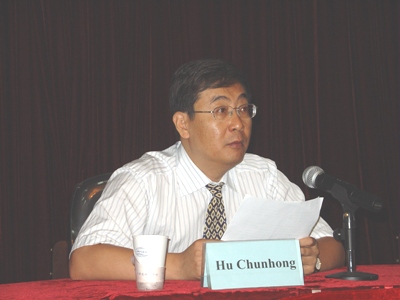|
![]() 
Speech made by Prof. Dr. Hu Chunhong, Secretary
General and Vice Director of IRTCES at the opening ceremony of
training workshop, Sept. 12 2005, Beijing
Respected
Dr. Y. Aoshima,
Director
and Representative of UNESCO Office Beijing
Dear
Friends and Colleagues,
Ladies and
Gentleman,
Good
Morning! It is my pleasure and great honor, on behalf of the
International Research and Training Center on Erosion and
Sedimentation (IRTCES),
to extend our sincere
congratulations on the opening of the International Training
Workshop on Watershed Eco-environment and Water Resources Management
and to welcome heartily all participants from 9 countries to come to
IRTCES for attending this important training activity. This training
workshop is funded and supported by UNESCO-IHP and the Ministry of
Water Resources, China, and organized by IRTCES in cooperation with
UNESCO Office Beijing. At the moment, I am most grateful to UNESCO
Office Beijing and Chinese Government for their great contributions
to this International Training program.
IRTCES was jointly set up by the Government of China
and UNESCO on July 21, 1984, in Beijing, China. Since its founding,
IRTCES has implemented a series of research and training program on
erosion,sedimentation
and watershed management. About 30 international,regional
and domestic training courses and workshops in the different fields
pertaining to sediment research were organized by IRTCES. Based on
the needs of member countries of UNESCO, since 2000, IRTCES has
successfully organized several training courses for the young
engineers from DPRK, Mongolia and China, within the framework of
UNESCO’s water science. I am sure the International Training
Workshop on Watershed Eco-environment and Water Resources Management
will certainly be a next event of the successful training series.
The International Training Workshop on Watershed
Eco-environment and Water Resources Management is a 9-day training
program to study basic theory on mechanics of sediment transport;
fluvial processes; watershed eco-environmental management, and water
resources management. The training will include lectures, workshop,
laboratory visit, field study and discussions. There are 30
participants coming from 9 countries, including DPRK, Korea,
Mongolia, Iran, Pakistan, Kazakhstan, Kyrgyzstan, Tajikistan and
China. I believe that the training workshop will provide the
participants with a good opportunity not only to share technical
and scientific knowledge, and exchange information in the field of
sediment and eco-environmental conservation but also to promote
future cooperation and friendship among them. I wish every success
of this training program and all the participants have an enjoyable
stay in China.
|

